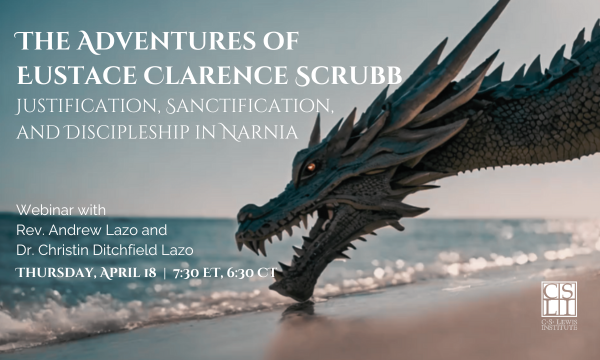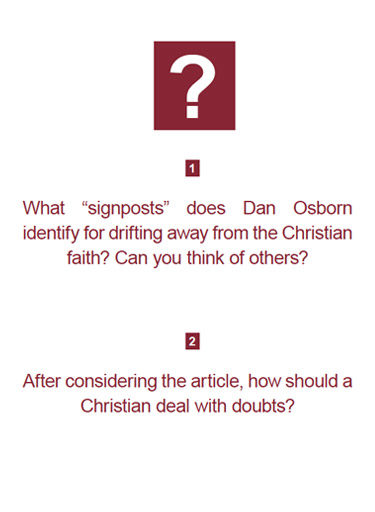Back to series


Recommended Reading:
Recommended Reading:

Download or Listen to Audio
Thoughts on Why People Drift From Faith
Click here to open a Print-Friendly PDF
I've always been intrigued by the idea and the practice of the “latest cultural fad.” How is it that this new thing bursts onto the scene, demands society’s attention, affection, and resources and then vanishes into thin air only to be noticed again at a neighborhood garage sale some ten years later? Perhaps you rushed into the store prepared to pay a small fortune to secure the last Cabbage Patch Kid, Tickle Me Elmo, or Beanie Baby for a loved one.
 What creates the craze surrounding these fads, and why are we so quick to jump toward the latest thing? These involve interesting questions about humanity, meaning, and acceptance that we don’t have the time to address in this article.
What creates the craze surrounding these fads, and why are we so quick to jump toward the latest thing? These involve interesting questions about humanity, meaning, and acceptance that we don’t have the time to address in this article.
But here’s the short answer: We follow these fads because those around us are following these fads. There is a momentum that can build as more and more associates participate in these latest crazes, and so we, too, enter in.
In circles of Christianity, there is a craze developing that, although it isn’t at all new, is gaining momentum among many who at one time have called themselves Christians in the traditional and orthodox sense.
What is this “fad”? I see evolving out of Christianity a more societally accepted view of spirituality. Within the past few years, some prominent men and women have publicly exited the apparently “naïve” Christian faith for a faith that is more palatable and intellectually pleasing.
As with the idea of a fad, I’ve been intrigued — and concerned — about this development. I’m intrigued, in that I wonder what has been developing in the hearts and souls of these men and women over the years that has ultimately led to this exit; I’m concerned as I fear for those close to me and also myself that we too might fall prey to that same lure and craze.
How did we get here? I identify what I’ll call the journey and the drift.
The “Journey”
For years now, the church has referred to the process of following Christ as being one’s spiritual “journey.” You’ll often hear phrases such as “We don’t know where you are in your spiritual journey,” or, “We’d love to talk with you about the next steps in your journey.” Although the idea of a spiritual journey has been used as a helpful analogy in classic works such as John Bunyan’s The Pilgrim’s Progress, in today’s world the journey language carries some unwanted baggage.
Unknowingly, by using the journey language, the church may facilitate an erroneous understanding of what it means to be surrendered to Christ and to live as a disciple of Him. To follow Christ may now be thought of as a mystical and developing process rooted in one’s ability to “evolve” into the next step of growth or the next leg of the journey.
The church’s use of this language has caused many to define their engagement with Christianity with the same language found in a simple Google search for spiritual journey:
A spiritual journey is a journey you would take to find out who you are, what your problems are in life, and how to come to peace with the world. The purpose of a spiritual journey is rarely to find an answer; rather, it is a process of continually asking questions.1
This is the view the church is unintentionally connecting with what it means to follow Christ, thereby allowing men and women to self-define discipleship and surrender in accordance with one’s own terms, likings, and experience.
It is such a contrast from what we see 2 Peter 1:3, “His divine power has granted to us all things that pertain to life and godliness, through the knowledge of him who called us to his own glory and excellence.”2 This is not journey language but an anchoring language.
The focus of this beginning to 2 Peter tells the reader that the life we live as we follow Christ is not to be self-focused, is not to be rooted in one’s own experiences and emotions, but rather to be lived in the certain and growing knowledge of God’s work and calling.
Notice the shift of focus that Peter is making; to follow Christ is to fixate on the certain nature of God rather than the ever-changing nature of our fleeting emotions and desires. The journey language that the church sometimes uses allows us to define spiritual growth in tremendously, and dangerous, individualistic and relativistic terms. It is in that soil of human fixation that the seed of apostasy3 is birthed.
The Drift
One of C.S. Lewis’s better-known works, The Screwtape Letters, highlights interaction between Screwtape, a senior demon and instructor, and Wormwood, a demon in training. Screwtape lays out effective ways to undermine the Words of God and cause those who follow God to abandon their belief and Christian commitment. Wily Screwtape gives Wormwood this gem of wisdom regarding the temptation necessary to cause one to abandon belief in God:
You will say that these are very small sins; and doubtless, like all young tempters, you are anxious to be able to report spectacular wickedness. But do remember, the only thing that matters is the extent to which you separate the man from the Enemy [God]. It does not matter how small the sins are provided that their cumulative effect is to edge the man away from the Light and out into the Nothing. Murder is no better than cards if cards can do the trick. Indeed the safest road to Hell is the gradual one — the gentle slope, soft underfoot, without sudden turnings, without milestones, without signposts.4
The Screwtape Letters is to remind readers of the vital truth: following Christ, and grow in affection for Him and the Words of God, requires staying intentionally focused on the things of God rather than allowing the lesser things of this world to control one’s heart. A very familiar refrain is given in Hebrews 2:1, “Therefore we must pay much closer attention to what we have heard, lest we drift away from it.”
Pay close attention to your heart, your affections; if you don’t, the drift into unbelief is knocking at your heart’s door. So, as I hear stories of men and women who once professed strong belief in the things of God and now are walking away into unbelief, I want to know what that drift looks like, lest I too become a story of one who once believed but now walks in unbelief.
Signposts of the Drift
 Early one morning a few weeks ago, I landed in the Cleveland airport to head back home for a midmorning meeting. I feverishly rushed out of the airport, found my car, and eased onto the turnpike. After about twenty-five minutes, I saw a sign announcing that I was ninety miles from Toledo.
Early one morning a few weeks ago, I landed in the Cleveland airport to head back home for a midmorning meeting. I feverishly rushed out of the airport, found my car, and eased onto the turnpike. After about twenty-five minutes, I saw a sign announcing that I was ninety miles from Toledo.
That’s useful information as you travel, but it can be alarming if you are heading in the wrong direction. In my rush, I had started my drive home by heading west rather than east! A signpost can inform you of your destination, but it can also be useful in letting you know that you’re heading in an unintended direction.
There are indeed marks along the way that will inform us of our spiritual condition. These signposts will tell us of our affections and desires and ultimately reveal if we are indeed following Christ or drifting away from the One whom we once professed to be our Lord.
Although the following warnings are by no means meant to be an exhaustive list, I believe that these three signposts are useful; if you see them in your life, may they give you pause.
Signpost 1: A Fixation on the Here & Now
An early warning sign in a believer’s heart is a turning of one’s eyes off of Jesus Christ and a fixation on the things that are very temporary in nature. There is nothing wrong in having the things of this world: a nice car, a nice house, a good job. The things, by themselves, are morally neutral.
They become dangerous when they find their way into the inner place of one’s being where identity is formed and protected. Similarly, supportive friends, a loving spouse and wonderful children can become a danger if we put them ahead of Christ. The innermost part of one’s being is where only Christ should sit and rule; this is why Christ repeatedly told those who followed Him that it’s impossible to serve two masters.
The natural question that arises is, how do I know if the things of my life have found their way into this most inner part of my being? The practical answer is different in application for each of us but the same in principle: Are the temporary things in my life and other people, including family, demanding more of my affection, work, and focus than I am willingly and actively surrendering to Christ? Do I spend my energies physically, mentally, and emotionally centered on building and protecting these things? To gain more of this world, am I willingly and actively compromising on the things that Christ has called me to do and be? These are tremendously difficult questions to work through, but they are the very questions that Christ asked those who wished to follow Him.5
This signpost is warning us of the danger of compromise. As we fixate on the things of this world over and above the reign of Christ in our lives, compromise becomes the practice of our lives. Small compromises of time and resources can grow into compromises regarding the teaching and application of the Word to our lives; ultimately the faith that we profess is not the Christian faith but rather some conglomeration of humanism, spiritualism, with a sprinkling of Christian phrases for good measure.
Signpost 2: A Failure to Be Cautious
 When writing to a young pastor in Ephesus on how to stand for Christ in a culture inside and outside of the church that was increasingly opposed to the teachings of Christ, Paul told him, “Keep a close watch on yourself and on the teaching” (1 Tim. 4:16). In the church, there was a rather cavalier attitude developing of which the leader, Timothy, needed to be aware. His awareness of that liberality was to be centered on two aspects of his life: his own obedience to Christ and the way that he taught others to obey Christ.
When writing to a young pastor in Ephesus on how to stand for Christ in a culture inside and outside of the church that was increasingly opposed to the teachings of Christ, Paul told him, “Keep a close watch on yourself and on the teaching” (1 Tim. 4:16). In the church, there was a rather cavalier attitude developing of which the leader, Timothy, needed to be aware. His awareness of that liberality was to be centered on two aspects of his life: his own obedience to Christ and the way that he taught others to obey Christ.
Just as in Timothy’s day, there is in our time a tremendous danger with the cavalier way the truths of Scripture are treated both personally and publicly. When the words of Christ are read as a suggestion rather than the authoritative Word of the Creator of the universe, we will find ourselves in significant danger of abandoning His teachings all together.
Those who have abandoned the faith publicly have long before abandoned a healthy respect, surrender, and obedience to the Word of God.
As Paul wrote to Timothy to keep watch on himself and his teachings, so too we must be hypervigilant in the way we interpret the teachings of God’s Word to ensure that our wayward hearts are not compromising these truths, allowing them to become relative suggestions. We must pour our engagement with God’s Word through the filter of God’s Word rather than our human emotions. For as the Word of God says:
The heart is deceitful above all things,
And desperately sick;
Who can understand it? (Jeremiah 17:9)
Signpost 3: Dwelling in Doubt
 Some have boldly asserted that in Christianity doubt is not welcome. A quick perusal of the book of John will reveal that Christ dealt generously with one of His disciples who doubted all that he had witnessed and experienced (John 20:24–29). So doubt is not a problem in the life of a Christian.
Some have boldly asserted that in Christianity doubt is not welcome. A quick perusal of the book of John will reveal that Christ dealt generously with one of His disciples who doubted all that he had witnessed and experienced (John 20:24–29). So doubt is not a problem in the life of a Christian.
However, doubt has a slippery and sneaky side to it that tells us the answers to our doubts are found in more questions and more doubt. Perhaps you have found yourself caught in this riptide at one time or another. This is the spiritually deadly side of doubt, where answers are not the goal of doubt.
By all appearances you appear as a “thinker.” But you are no thinker; you are one who is being misled into thinking that “answers” and “questions” are the same thing. The devil’s playground is not just an idle mind and hands but in creating a mind that does not want to settle for answers. One’s doubts, when left unchecked by Christian faith, will turn in on themselves and create deeper and deeper unanswerable doubts that will indeed ultimately lead to an abandonment of that which once anchored one’s soul.
In James 1, we see James addressing the reality of wisdom, doubt, and the desired answers from God as he teaches people what it means to live as Christians in a fallen world. James instructs Christians that our questions must be directed at the One who can answer them. Then James goes one step further to impress a point: we must believe that God has given us His answer and believe that His way is best.
Failure to do so will result in a spiritually exhausted and tumultuous reality; James compares a lack of belief with being tossed to and from in a storm. This we see in others and experience in our own hearts as we doubt and do not believe God for the answers, because His answers do not satisfy our fleshly wants and desires.
Am I saying that we should pretend we don’t have these moments of doubt? Not at all. Rather, a Christian’s doubts can be moments of growth as we prayerfully and genuinely go deeper to God for the answers He will give. In Jeremiah 29:13, we are told, “You will seek me and find me, when you seek me with all your heart.”
Doubts in the Christian life are not evidence of a lack of faith, but rather an opportunity to grow in trust of the One who promises to hear His children when they cry and seek Him. Far too often, we fall prey to the fleshly pull and do not seek God for the answer for which our soul is crying out. Doubt for the sake of doubt creates plenty of intellectual fodder but is deadly for the soul.
The Hope
At the end of The Screwtape Letters (spoiler alert!), it becomes apparent that the younger demon has failed in his task to cause the follower of Christ to abandon his faith. Screwtape, the elder demon, chastises the younger Wormwood for failing to properly divert this follower of Christ.
 How well I know what happened at the instant when they [the angels] snatched him from you! There was a sudden clearing of his eyes (was there not?) as he saw you [Wormwood] for the first time and recognized the part you had in him and knew that you had it no longer.
How well I know what happened at the instant when they [the angels] snatched him from you! There was a sudden clearing of his eyes (was there not?) as he saw you [Wormwood] for the first time and recognized the part you had in him and knew that you had it no longer.
Just think… what he felt at that moment; as if a scab had fallen from an old sore, as if he were emerging from a hideous, shell-like tatter, as if he shuffled off for good and all a defiled, wet, clinging garment.6
As we live in this era where there is the lure of a better, more mystical, more “evolved” level of spirituality to which we must ascend, it is my hope for myself and for all of us who proclaim the name of Christ as our Savior that we become aware of the ever-present lure of self and surrender to the One who has defeated the enemy and given ultimate life! In that surrender, may we all rejoice in the new reality of His presence that defines us and remakes us!
I close with a word from the book of Jude, written to Christians who were in a situation similar to ours. Here is Jude’s encouragement to them on how to stand in the faith that was given them through Jesus Christ:
But you, beloved, building yourselves up in your most holy faith and praying in the Holy Spirit, keep yourselves in the love of God, waiting for the mercy of our Lord Jesus Christ that leads to eternal life…
Now to him who is able to keep you from stumbling and to present you blameless before the presence of his glory with great joy, to the only God, our Savior, through Jesus Christ our Lord, be glory, majesty, dominion, and authority, before all time and now and forever. Amen. Jude 20–21, 24–25
|
Notes:
|
|||

Dan Osborn
PastorDan Osborn, Pastor of Adult Ministry. Dan Osborn serves as pastor of adult ministry at Old North church in Canfield, OH. He grew up in Northeast Ohio and attended Cedarville University for his undergrad, majoring in Theology with an emphasis in Pastoral Studies. Upon graduating, he began pastoring and served in that capacity in two churches and in multiple roles from 1999 -2013. In 2013 he started the Northeast Ohio Chapter of the C.S. Lewis Institute – a para church disciple-making organization where we have been privileged to see over one hundred men and women from Northeast Ohio engage in the year-long Fellows program.

Recommended Reading:
John Piper, “The Danger of Drifting from the Word” (A message available from DesiringGod.org)
John Piper states: “Drifting is infinitely dangerous. Oh, that I could waken you all to be joyfully vigilant in living the Christian life of looking to Jesus, and considering Jesus, and listening to Jesus. His yoke is easy and his burden is light — as easy as listening and as light as looking. But if we neglect this great salvation, and drift into the love of other things, then we will not escape. We will perish. The mark of the true child of God is that that he does not drift for long...”
Recommended Reading:
John Piper, A Peculiar Glory: How the Christian Scriptures Reveal Their Complete Truthfulness (Crossway, 2016)
God has provided a way for all people, not just scholars, to know that the Bible is the Word of God. John Piper has devoted his life to showing us that the glory of God is the object of the soul’s happiness. Now, his burden in this book is to demonstrate that this same glory is the ground of the mind’s certainty.
God’s peculiar glory shines through his Word. The Spirit of God enlightens the eyes of our hearts. And in one self-authenticating sight, our minds are sure and our hearts are satisfied. Justified certainty and solid joy meet in the peculiar glory of God.
 COPYRIGHT: This publication is published by C.S. Lewis Institute; 8001 Braddock Road, Suite 301; Springfield, VA 22151. Portions of the publication may be reproduced for noncommercial, local church or ministry use without prior permission. Electronic copies of the PDF files may be duplicated and transmitted via e-mail for personal and church use. Articles may not be modified without prior written permission of the Institute. For questions, contact the Institute: 703.914.5602 or email us.
COPYRIGHT: This publication is published by C.S. Lewis Institute; 8001 Braddock Road, Suite 301; Springfield, VA 22151. Portions of the publication may be reproduced for noncommercial, local church or ministry use without prior permission. Electronic copies of the PDF files may be duplicated and transmitted via e-mail for personal and church use. Articles may not be modified without prior written permission of the Institute. For questions, contact the Institute: 703.914.5602 or email us.
-
Recent Podcasts
The Side B Stories – Dr. James Tour’s story
by Jana Harmon, James Tour on April 12, 2024From a secular Jewish home, scientific scholar and...Read More
-
Why are Christians so Bad?
by Paul Joen on April 5, 2024
-
Questions That Matter Podcast – Dai Hankey and Gospel Hope for Weary Souls
by Randy Newman, Dai Hankey on April 5, 2024
-
Recent Publications
Isn’t Morality Relative?
by Christopher L. Reese on April 1, 2024It is widely accepted in the Western world...Read More
-
Do Muslims and Christians Worship the Same God?
by Andy Bannister on March 1, 2024
-
Artificial Intelligence and Its Impacts on Humanity
by John Lennox on February 13, 2024
0
All Booked
0.00
All Booked
0.00
All Booked
21934
GLOBAL EVENT: The Adventures of Eustace Clarence Scrubb (CSLI-Atlanta & CSLI-Chicago) 7:30PM ET/ 6:30PM CT
https://www.cslewisinstitute.org/?event=global-event-the-adventures-of-eustace-clarence-scrubb-csli-atlanta-csli-chicago-730pm-et-630pm-ct&event_date=2024-04-18®=1
https://www.paypal.com/cgi-bin/webscr
2024-04-18

Next coming event
Days
Hours
Minutes
Seconds
GLOBAL EVENT: The Adventures of Eustace Clarence Scrubb (CSLI-Atlanta & CSLI-Chicago) 7:30PM ET/ 6:30PM CT
On April 18, 2024 at 7:30 pm Virtual Online EventSpeakers

Dan Osborn
Pastor
Team Members

Dan Osborn
PastorDan Osborn, Pastor of Adult Ministry. Dan Osborn serves as pastor of adult ministry at Old North church in Canfield, OH. He grew up in Northeast Ohio and attended Cedarville University for his undergrad, majoring in Theology with an emphasis in Pastoral Studies. Upon graduating, he began pastoring and served in that capacity in two churches and in multiple roles from 1999 -2013. In 2013 he started the Northeast Ohio Chapter of the C.S. Lewis Institute – a para church disciple-making organization where we have been privileged to see over one hundred men and women from Northeast Ohio engage in the year-long Fellows program.






